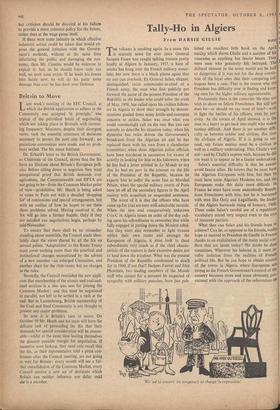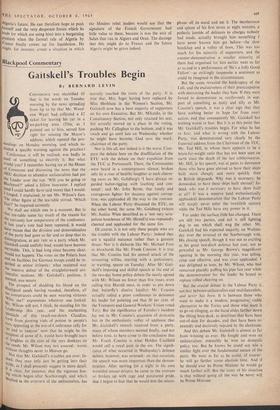Tally-Ho in Algiers
From DARSIE GILLIE PARIS PTIat: volcano is smoking again. In a sense this 1 is scarcely news for ever since General Jacques Faure was caught talking treason pretty loudly at Algiers in January, 1957, a haze of smoke has hung over the French military moun- tain; but now there is a black plume again that no one can overlook. Ex-General Salan, elegant, distinguished, twice commander-in-chief of a French army, the man who first publicly put forward the name of the present President of the Republic as the leader who could solve the crisis of May, 1958, has called upon his civilian follow- ers in Algeria to show their strength by demon- strations graded from noisy kettle-and-saucepan concerts to strikes. Satan was once what you could convincingly call on the run. But you can scarcely so describe his situation today, when his dynamite has twice driven the Government's broadcasts from the Algerian air and he has replaced them with his own from a clandestine transmitter; when three Algerian police officials have been murdered in succession for excess of activity in looking for him or his followers; when he has had a letter printed in Le Monde to say that he had no part in the attempt on the life of the President of the Republic, because be expects him to suffer the same fate as Marshal Pdtain; when the special military courts of Paris have let off all the secondary figures in the April mutiny with acquittals or suspended sentences.
The worst of it is that the officers who have come up for trial are men wit admirable records. When the new and comparatively unknown C-in-C in Algeria issues an order of the day call- ing upon his subordinates to remember that while fully engaged in putting down the Moslem rebel- lion they must also remember to fight treason within their own ranks and amongst the Europeans of Algeria, it must look to these subordinates very much as if the chief charac- teristic of the traitors is their excessive desire not to haul down the tricolour. What was the present President of the Republic condemned to death for in 1940, if not that? Jacques Fauvet and Jean Planchais, two leading members of the Monde staff who cannot for a moment be suspected of sympathy with military putsches, have just pub- lished an excellent little book on the April mutiny which shows Chalk and a number of 4iS comrades as anything but fascist beasts. They were men who genuinely felt betrayed. The disloyal element in the army would not be half so dangerous if it was not for the deep convic- tion of the loyal ones that their conspiring col- leagues have a case. That is the reason why the President has difficulty now. in finding and keep- ing men for the higher military appointments.
Fortunately there is the conscript. He may not wish to shoot on fellow Frenchmen. But still less does he—or should we say most of him?—wisb to fight the battles of his officers, even by pas' sivity. As the events of April showed, it is the man in a hurry to get back into mufti who makes mutiny diflicult. And there is yet another difil' culty as between soldier and civilian, this time the civilians of Algeria. If it is going to suc- ceed, any future mutiny must be a civilian as well as a military undertaking. This, Challe's was not—and by Challe's express wish, because he did not want it to appear to be a fascist undertaking.
Salan's essential difficulty is that he cannot avoid fascist allies. He knows that he must have the Algerian Europeans with him; but then he must have some Algerian Moslems too, and the Europeans make this daily more diflicult. In France he must have some undoubtedly Repub- lican Frenchmen with him, but he is burdened with men like Ortiz and Lagaillarde, the leader of the Algiers barricade rising of January, 1960. These make Salan's careful use of a republican vocabulary sound very suspect even to the ears of innocent patriots.
What then can Satan and his friends hope to achieve? Can he, as opposed to his friends, really hope to succeed to President de Gaulle in Franco thanks to an exploitation of the many social con- flicts that are latent today? No doubt he does sometimes. Wherever his hideout is, it must in" volve isolation from the realities of French political life. But he can hope to obtain control of the towns in Algeria where Europeans arc strong as the French Government's control of the country becomes more and more obviously pro- visional with the approach of the referendum on We 'ad to remove 'int temporary to change 'is expression.' Algeria's future. He can therefore hope to push himself and the very desperate forces which he leads (or which are using him) into a bargaining Position when the formal rule of Algeria by France finally comes up for liquidation. He 'night, for instance, create a situation in which the Moslem rebel leaders would say that the signature of the French Government had little value to them*, because it was the writ of Salan that ran in Algiers and Oran. The damage that this might do to France and the future Algeria might be grave indeed.















































 Previous page
Previous page